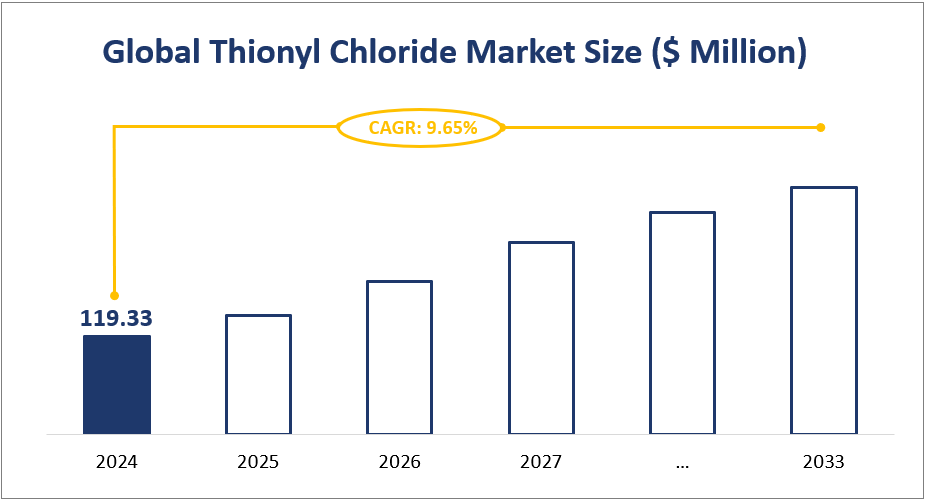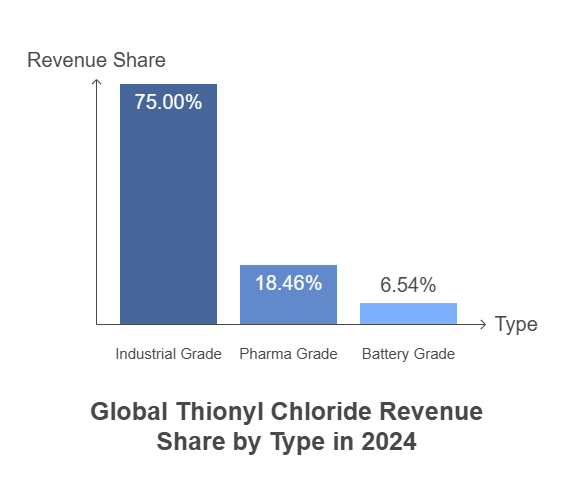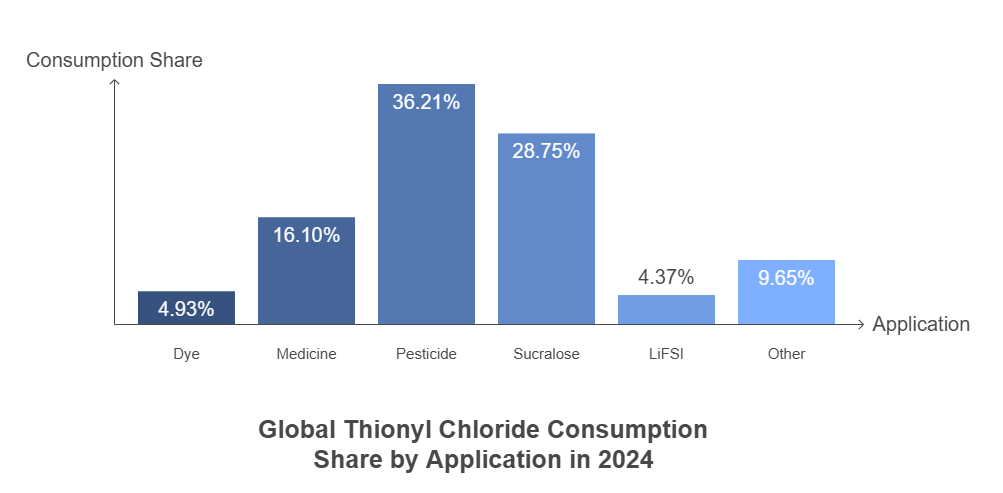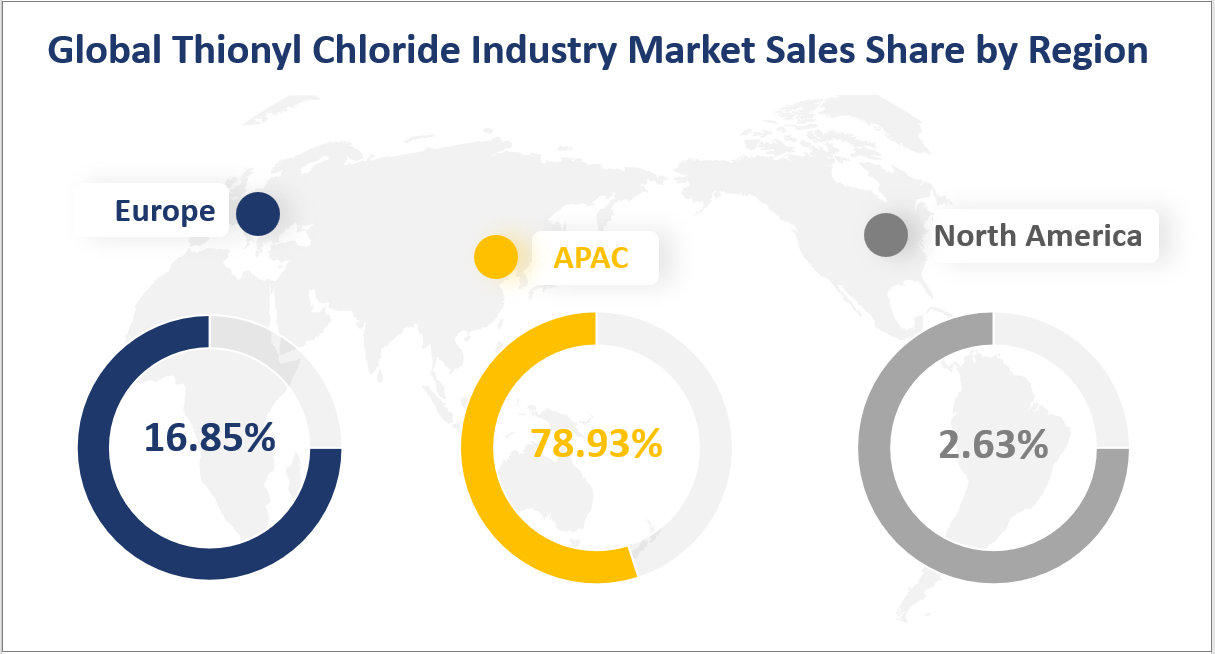1 Global Thionyl Chloride Market Size (Revenue) and CAGR (2024-2033)
The global thionyl chloride market size is projected to reach 119.33 million USD in 2024, with a CAGR of 9.65% from 2024 to 2033.
Thionyl chloride, a colorless to pale yellow or red liquid with a pungent odor, is an essential inorganic fine chemical product widely used in pharmaceuticals, pesticides, dyes, chemicals, and organic synthesis reactions. It serves as a precursor for dyes, a solvent in herbicide production, and an electrolyte in lithium batteries.
The thionyl chloride market is driven by the growing pharmaceutical industry, where it plays a crucial role in the synthesis of drug compounds and intermediates. The expanding agrochemical sector, with its increasing demand for pesticides, also fuels market growth. However, the market faces challenges such as volatility in raw material prices and stringent environmental regulations. Raw material costs can fluctuate significantly, affecting profitability and supply chain stability. Additionally, thionyl chloride’s toxic nature and potential environmental hazards are subject to strict regulatory compliance, posing obstacles to market growth.
Figure Global Thionyl Chloride Market Size (M USD) Outlook (2024-2033)

2 Thionyl Chloride Industry Trends
Table Industry Trends
Item | Descriptions |
As the awareness of sustainable development gradually spreads. Governments, enterprises, and individuals all attach great importance to environmental protection, and this trend is also affecting the Thionyl Chloride industry. Thionyl Chloride manufacturers are increasingly exploring environmentally friendly production processes and greener alternatives to meet the rising demand while minimizing the chemical’s environmental impact. For example, Shandong Kaisheng New Materials focuses on circular economy and green development concepts and continuously improves its technological level to reduce pollution. Specifically, the company overcame contamination difficulties in product preparation greatly. In the tail gas treatment stage, the company uses injection pressurization technology to re-enter the unconverted sulfur dioxide in the sulfoxide fluoride reaction process into the reactor and convert it again, realizing the recycling of sulfur dioxide, reducing environmental pollution, and also reducing production costs. The company’s R&D investment in exhaust gas treatment technology and production process optimization enables the company to meet environmental protection regulations while maximizing economic benefits. Sulfur dioxide SO2 recycling technology and efficient exhaust gas treatment processes also make the actual gas pollutants generated by the company’s production lines very low. The survey shows that the company’s total pollution emissions in 2020 were lower than most of its peers. These introductions of technology can significantly improve the company’s tolerance for risks that may arise from future environmental policy changes and promote the company’s sustainable development. Meanwhile, with more consumers pushing for greener business practices, adopting efficient environmental technology can also help improve the Thionyl Chloride companies’ reputation among more environmentally conscious people, which is conducive to expanding the market share of Thionyl Chloride companies. | |
Application Expansion in Energy Storage | The increase in the use of thionyl chloride in the production of lithium-ion batteries is another opportunity for the thionyl chloride market. Thionyl chloride is used in the production of lithium-ion batteries as it reacts with lithium metal to form lithium chloride, which is used as an electrolyte in lithium-ion batteries. The further development of the global automotive industry and consumer electronics industry will increase the demand for lithium electronics. The growing demand for energy storage solutions, such as lithium-ion batteries, has opened up new avenues for Thionyl Chloride application. In lithium thionyl chloride batteries the anode material is thionyl chloride. This characteristic makes its specific energy very high. Lithium thionyl chloride batteries have excellent energy density, long service life, and stable performance over a wide temperature range, making them an ideal powering solution for devices such as consumer electronics. Lithium thionyl chloride batteries have high energy density, which means they can store large amounts of energy in a compact space. They are well suited for use in devices where space is limited but energy consumption needs to be minimized. In addition, these batteries have a long lifespan, which can reduce replacement costs. Also, lithium thionyl chloride batteries have a low self-discharge rate, which means that the batteries hold their charge well, even when the device is not in use. Due to their high durability and unique characteristics, they can also be used in industrial battery-powered products – the aerospace industry, the vehicle industry, different types of meters and IIoT devices, and so on. It is expected that these industries will increase their use of lithium thionyl chloride batteries in the future, which will be a new opportunity for the Thionyl Chloride market growth. |
3 Global Thionyl Chloride Market by Type in 2024
In 2024, the global thionyl chloride market is segmented into industrial grade, pharma grade, and battery grade. Industrial grade thionyl chloride, with a revenue of 89.50 million USD, accounts for the largest share, followed by pharma grade at 22.03 million USD and battery grade at 7.80 million USD. Industrial grade thionyl chloride is used in the production of pesticides and other chemicals, while pharma grade serves the pharmaceutical industry for synthesizing Vitamin C, Ester G, and vaccine preservatives. Battery grade thionyl chloride is primarily used in lithium-thionyl chloride batteries, benefiting from the growing demand for energy storage solutions in consumer electronics and the automotive industry.
The market size data for different types shows that Industrial Grade holds 75.00% of the market share, Pharmaceutical Grade holds 18.46%, while Battery Grade holds 6.54%. These data reflect the demand and market potential for Thionyl Chloride in different applications.
Table Global Thionyl Chloride Revenue (M USD) by Types in 2024
| 2024 |
Industrial Grade | 89.50 |
Pharma Grade | 22.03 |
Battery Grade | 7.80 |
Total | 119.33 |
Figure Global Thionyl Chloride Revenue Market Share by Type in 2024

4 Global Thionyl Chloride Market by Application in 2024
In the year 2024, the global thionyl chloride market is anticipated to be distributed across various applications, each contributing significantly to the market’s overall value. The market size by application provides a detailed insight into the demand drivers for thionyl chloride. The dye industry is projected to consume 23.5 K Tons, representing a 4.93% share of the total market, reflecting its use in the chlorination processes within dye production.
The pharmaceutical sector, a key consumer of thionyl chloride, is expected to account for 76.6 K Tons, or 16.10% of the market, due to its extensive use in the synthesis of drug intermediates and active ingredients. Pesticide manufacturing, a substantial user of thionyl chloride, is forecasted to consume 172.4 K Tons, holding a dominant 36.21% share, highlighting its importance in the production of various agrochemicals.
The sucralose industry, driven by the demand for low-calorie sweeteners, is set to utilize 136.9 K Tons, capturing 28.75% of the market. Lastly, the LiFSI segment, crucial for lithium-ion battery electrolytes, is projected to consume 20.8 K Tons, representing 4.37% of the total market. Other applications, including a variety of industrial and chemical processes, are expected to account for 45.9 K Tons, or 9.65% of the market. These figures underscore the diverse applications of thionyl chloride and its integral role in these industries, with the pesticide and sucralose sectors being the most significant contributors to market demand.
Table Global Thionyl Chloride Consumption (K Tons) by Applications in 2024
| 2024 |
Dye | 23.5 |
Medicine | 76.6 |
Pesticide | 172.4 |
Sucralose | 136.9 |
LiFSI | 20.8 |
Others | 45.9 |
Total | 476.1 |
Figure Global Thionyl Chloride Sales Market Share by Application in 2024

5 Global Thionyl Chloride Market by Region in 2024
The distribution of the global thionyl chloride consumption across regions in 2024 paints a picture of market demand and industry focus. North America, with a consumption market share of 2.63%, represents a modest portion of the total consumption, indicating a stable demand for thionyl chloride in this region, likely due to its established industries and relatively lower growth compared to other regions.
Europe, with a market share of 16.85%, holds a significant position, reflecting the region’s strong presence in the chemical and pharmaceutical sectors, which are major consumers of thionyl chloride. Asia Pacific dominates the market with an overwhelming 78.93% share, highlighting the rapid industrial growth and the burgeoning demand for thionyl chloride in countries like China, Japan, and India, where the chemical is widely used in various industries. The Others category, with a 1.82% share, includes regions that are either in the early stages of industrial development or have specialized niche markets for thionyl chloride.
This distribution underscores the unbalanced pattern of the global market, with the Asia-Pacific region being the major consuming region due to its rapid industrialization and booming manufacturing sector, while other regions have smaller market shares based on their specific industrial needs and market developments. Overall, the market share analysis reveals the concentration of thionyl chloride consumption in Asia Pacific and the significant role that regional industrial development plays in driving market demand.
Figure Global Thionyl Chloride Sales Market Share by Region in 2024

6 Global Thionyl Chloride Market Top 3 Players
Shandong Kaisheng New Materials
Shandong Kaisheng New Materials, established in 2005 and headquartered in China, is a high-tech enterprise engaged in the research and development, production, and sales of fine chemical products and new polymer materials. It is recognized as the world’s largest production base for sulfolane and a major domestic producer of aromatic polyamide monomers. The company’s product portfolio includes Thionyl Chloride, isophthaloyl chloride/terephthaloyl chloride, 4-nitrobenzoyl chloride, 2-propoxyethyl chloride, and polyetherketoneketone (PEKK). In 2024, Shandong Kaisheng New Materials achieved a revenue of 28.46 M USD with a gross margin of 33.16%, indicating a robust financial performance in the thionyl chloride market.
LANXESS, founded in 2004 and headquartered in Germany, operates globally with plant locations in Germany, the USA, China, India, Japan, and South Korea. The company is a specialty chemical manufacturing company that develops, manufactures, and markets chemical intermediates, additives, specialty chemicals, and plastics. Its product range for the production of vehicle batteries includes raw materials for cathode materials and non-flammable electrolytes, ion-exchange resins for extracting and recycling ultra-pure metal compounds for cathode materials, flame retardants and coolants, and polyurethane (PU) casting compounds for protecting electronic battery components. In 2024, LANXESS recorded a revenue of 23.24 M USD with a gross margin of 30.80%, showcasing its strong position in the thionyl chloride market.
CABB, established in 1905 and headquartered in Germany, has a global presence with plant locations in Germany, Switzerland, Finland, the USA, and China. The company is a leading contract development and manufacturing company (CDMO) for starting materials, active ingredients, and advanced intermediates. CABB specializes in the production of customized, highly complex molecules for leading companies, particularly in the crop sciences, life sciences, and performance materials industry. In 2024, CABB achieved a revenue of 11.15 M USD and a gross margin of 34.21%, demonstrating its financial strength and market competitiveness in the thionyl chloride sector.
These three companies, with their diverse product offerings and global reach, have demonstrated their financial prowess in the thionyl chloride market. Shandong Kaisheng New Materials, with its focus on sulfolane and aromatic polyamide monomers, has shown consistent growth and a strong market presence. LANXESS, with its comprehensive portfolio for battery production and other chemical intermediates, has maintained a significant market share and financial stability. CABB, with its expertise in CDMO services and customized chemical production, has also shown a steady growth trajectory and a competitive edge in the market. Their revenues and gross margins for the year 2024 reflect their respective market strategies and operational efficiencies, positioning them as key players in the global thionyl chloride industry.
Table Global Thionyl Chloride Revenue Market Share Top3 Players in 2024
| 2024 |
Shandong Kaisheng New Materials | 23.85% |
LANXESS | 19.47% |
CABB | 9.34% |





